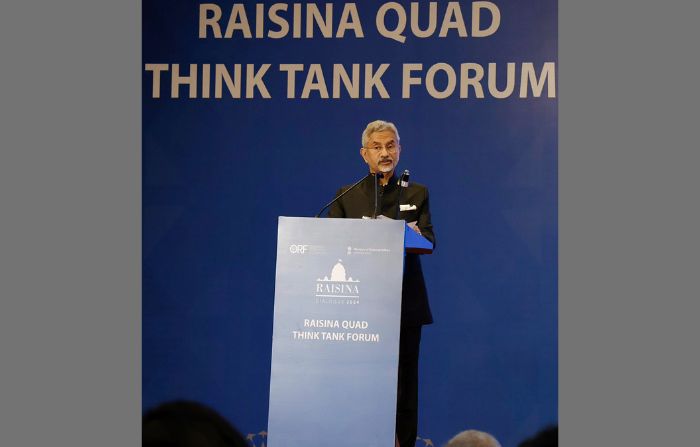- Friday, May 03, 2024
The Indian diplomat noted that Quad has become a substantive platform of the four vibrant democracies seeking to uphold an open and inclusive Indo-Pacific.

By: Shubham Ghosh
THE Quadrilateral Security Dialogue or Quad, as asserted by Indian external affairs minister Subrahmanyam Jaishankar, stands firm in its resolve to make autonomous decisions without yielding to external veto powers. Speaking at the inaugural Raisina Quad Think Tank forum on the sidelines of the Raisina Dialogue geopolitical conference in New Delhi on Saturday (24) the diplomat emphasized the four-member coalition’s commitment to longevity, expansion, and its role in bolstering global prosperity.
He described the grouping of India, the US, Japan and Australia as an “overhead light, creative, flexible, nimble and responsive” enterprise, noting it has become a substantive platform of the four vibrant democracies seeking to uphold an open and inclusive Indo-Pacific.
Read: India’s Jaishankar rakes up UN Security Council reform: ‘If they are short-sighted…’
The Indian external affairs minister said there are three clear messages about the Quad. “One, the Quad is here to stay. Two, the Quad is here to grow. And three, the Quad is here to contribute.”
Addressing the inaugural Quad Think Tank Forum on the sidelines of #RaisinaDialogue2024 https://t.co/YXIwdxS4Vh
— Dr. S. Jaishankar (@DrSJaishankar) February 24, 2024
Australian foreign minister Penny Wong, Japanese foreign minister Yoko Kamikawa and US deputy secretary of state Kurt Campbell also addressed the forum virtually.
The Quad is largely focused on the Indo-Pacific and China believes the coalition is aimed at containing it. Delving into the success of Quad, Jaishankar said all governments of all the four member countries have behaved differently from how they normally do.
Read: Russia has never hurt our interests: India’s Jaishankar to German news outlet
“Quad is an overhead light, creative, flexible, nimble, responsive and open-minded enterprise. These are not adjectives we normally associate with the bureaucracy.
“So, even as we assess its achievements, some compliments at least are due to all those who have shepherded it, who have grown it, who have actually made it unfold with such rapidity,” he said.
Jaishankar also explained the Quad’s broad framework.
“One, it reflects the growth of a multi-polar order. Two, it is a post-alliance and post-cold war thinking. Three, it is against spheres of influence. Four, it expresses the democratising of global space and a collaborative, not unilateral, approach. And five, it is a statement that in this day and age, others cannot have a veto on our choices,” he said.
Jaishankar noted that the Quad is facilitated by the emergence of the Indo Pacific, adding it is propelled by a change in the global order that requires “more” and “not less collaboration”.
The Quad focused on addressing the region’s most pressing needs and challenges including in areas of maritime security, infrastructure, connectivity, critical technologies, communications, space cooperation, cyber security, counter-terrorism, and climate action, he said.
Jaishankar highlighted two major programmes under the Quad framework –Indo-Pacific Maritime Domain Awareness (IPMDA) initiative and the Indo-Pacific Economic Framework (IPEF).
Under IPMDA, data is being supplied for countering illicit maritime activities and responding to climate-related and humanitarian events. The IPEF seeks to offer alternative economic engagement mechanisms and it is making steady progress and addressing issues like supply chains, clean economies, sustainability, digital economies amongst others, Jaishankar said.
While referring to India-initiated Indo-Pacific Oceans Initiative, he asserted that there should be no doubt about ASEAN (Association of Southeast Asian Nations) centrality in the Indo-Pacific .
“Sometimes, it has been suggested that somewhere these two concepts have diluted ASEAN centrality. I think anybody who doubts ASEAN centrality, when they look at the map of the Indo-Pacific, clearly missed their geography classes at school,” he said.
“And not just the geography class, I think they have probably passed up on all that has been happening in terms of the East Asia Summit process and how that today is actually a very unique and I would say irreplaceable architecture for this part of the world,” he said.
In her comments, Wong said Quad stands for a region that is free from intimidation and coercion”, where competition is managed responsibly and disputes are settled in accordance with international law.
Japanese foreign minister Kamikawa said the world is facing deep divisions and it is necessary to maintain and strengthen a free and open international order based on the rule of law.
“For this reason, Japan with its allies and like-minded countries is working to further develop a free and open indo-Pacific based on the rule of law,” she said.
“Quad is one of the most important initiatives to this end, has steadily implemented initiatives in maritime critical and emerging technologies, cyber and counter-terrorism, initiatives must continue to move forward,” she added.
US deputy secretary of state Campbell said the Indo-Pacific remains the world’s most dynamic and rapidly evolving region and that the strength of the Quad is its ability to harness the capabilities and resources of the four nations together to deliver concrete outcomes that benefit all.
“I want to emphasise the defining feature of our partnership — the Quad stands for an affirmative vision of a free and open Indo-Pacific in which we collectively build the capacity of our allies and partners,” he said.
“Quad not about forcing the region to choose between strategic competitors, it is about preserving and creating options so that communities, institutions and countries can make decisions to benefit their people,” he said.
(With PTI inputs)
![]()